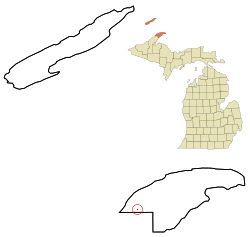Ahmeek, Michigan
| Ahmeek, Michigan | |
|---|---|
| Village | |

Hubbell Street, Downtown Ahmeek Village
|
|
 Location of Ahmeek in Keweenaw County, Michigan |
|
| Coordinates: 47°17′54″N 88°23′50″W / 47.29833°N 88.39722°WCoordinates: 47°17′54″N 88°23′50″W / 47.29833°N 88.39722°W | |
| Country | United States |
| State | Michigan |
| County | Keweenaw |
| Area | |
| • Total | 0.07 sq mi (0.18 km2) |
| • Land | 0.07 sq mi (0.18 km2) |
| • Water | 0 sq mi (0 km2) |
| Elevation | 869 ft (265 m) |
| Population (2010) | |
| • Total | 146 |
| • Estimate (2012) | 150 |
| • Density | 2,085.7/sq mi (805.3/km2) |
| Time zone | Eastern (EST) (UTC-5) |
| • Summer (DST) | EDT (UTC-4) |
| ZIP code | 49901 |
| Area code(s) | 906 |
| FIPS code | 26-00620 |
| GNIS feature ID | 2397918 |
Ahmeek is a village in Keweenaw County in the U.S. state of Michigan. The population was 146 at the 2010 census. The village is in Allouez Township. The name Ahmeek is derived from the Ojibwa (Chippewa) language. In Ojibway, amik means beaver.
Ahmeek is the only incorporated municipality in Keweenaw County.
The Ahmeek Mining Company opened in 1903. The local area grew because of its location on the Mineral Range Railroad. The village of Ahmeek was founded by Joseph Bosch in the year of 1904. Attorney James A. Hamilton became the first postmaster of Ahmeek on February 5, 1909, the same year in which it was incorporated as a village.
During the hate-filled Copper Country Strike of 1913–1914, the village of Ahmeek was the scene of much activity and conflict.
Leadership of the Western Federation of Miners (WFM) in the Keweenaw was more nearly indigenous than anywhere else within the strike zone. Sydney Thomas, born in England, and Andrew Pietala, a Finnish socialist, were the president and secretary, respectively, of the Keweenaw WFM local at Ahmeek. But the leaders of the strikers were, in James MacNaughton's description, "an Irish bunch called Dunnigan; they are perfect fire eaters." Patrick "Paddy" Dunnigan and his father, John Dunnigan, were miners. John Dunnigan had, as Paddy said,been elected as the mine inspector in Keweenaw County in opposition to the "bosses' wills." The elder Dunnigan had managed to Ahmeek WFM store, drawing $150 a month for that in addition to his $1,700 yearly pay as mine inspector, WFM critics pointed out. Paddy headed various morning parades by giving "that fire bell a couple of dings" and when the Ahmeek village marshal, Timothy O'Brien, objected, O'Brien was removed from his position. Dunnigan then became the marshal. Village President Morris Kennell was forced to resign. Mike Reilly, Dunnigan's brother-in-law, and then Alfred Haddy, a miner, then succeeded him.
...
Wikipedia
